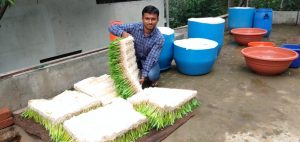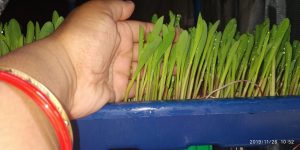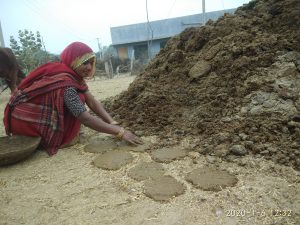“Living in deserts for centuries, our people know how precious water is. Our ancestors taught us to save every single drop of water. They are more precious than pearls,” Mahavir Singh tells me while pointing to the rainwater harvesting reservoir at the demo farm run by Urmul Health Research and Development Trust at their Bajju campus in Bikaner. The farm demonstrates the best sustainable and eco-friendly, agricultural practices that have yielded results.
From rainwater harvesting and forming seed banks to chemical-free organic farming to vermicomposting, the farm has inspired several farmers in the region to adopt these practices. Mahavir Singh, a resident of Bajju village in Bikaner district of Rajasthan, is the in-charge of this demo farm. He is a part of the revolution that is greening the arid landscape of his district. The demo farm is being run under Urmul’s Sustainable Agriculture Programme (SAP), funded by Oracle, and supported by Charities Aid Foundation OneStage.

“We have changed the landscape of the desert. At the centre, we have been able to grow about 400 fruit plants, in addition to a vermicomposting unit. Farmers from local areas are being trained here on sustainable agriculture practices,” Singh declares proudly.
The model is simple. Farmers here, own Rathi cows, a specific milk yielding breed of cattle, found in the arid regions of Rajasthan. The milk produced can be sold, while the cow-dung produced can be turned into compost for organic farming and also used as fuel in bio gas plant. Azolla –the green fodder used for the cattle can be grown along with the other crops. The water for irrigation can come from reservoirs storing rainwater. Additionally, the seeds produced can be stored in seed banks. All of this has been demonstrated well at the Bajju campus. I got the opportunity to interact with the group of farmers, who were trained at the Bajju center on developing a Azolla at the back yards.
SAP is contributing to Rajasthan government’s goal of doubling farmers’ income by 2022. The programme envisions, enabling a set of services – capacity building, infrastructure support, and ecosystem enhancement to passionate farmers in the districts of Bikaner and Nagaur. The program reached out to over a thousand farmers through field-work and the demo farm. So far the programme has directly benefited about 130 farmers.

Mahavir Singh further adds: “Income from agriculture is very low. To top it all, farmers are overburdened with input cost (cost of fertilizers, pesticides and seeds). Agriculture is not seen as a viable option for livelihood, farmers are looking towards other options for their sustainability. But large scale organic farming is a low cost, low input method, eco-friendly, sustainable method of agriculture. A big chunk of farmers practice animal husbandry, which gives them the opportunity to produce organic manure. If they are trained and capacitated, they can do this in more systematic way.”

Raju Bhai, who is the in-charge of the seed bank and SAP field representative of Manakaar village, Bikaner, Rajasthan says: “Farmers are taking a keen interest in alternative agricultural production with Azolla playing a significant role. It has emerged as a viable and sustainable alternative that is both economically feasible and environmentally sound. It helps improve the quality of milk produced and the health of the livestock.”
Ramesh saran, chief finance manager, Urmul says that the project aims at developing a working and replicable organic farm in the middle of the desert. “We are developing infrastructure for harvesting rainwater and renewable power and inspiring farmers to adopt organic and sustainable farming. This will help more farmers switch to responsible and sustainable agricultural practices.”
Rajasthan is already the leading producer of oilseeds and food grains. It is the largest producer of moth beans and third largest producer of pulses and wheat in India. Additionally, Rajasthan is the third largest producer of milk in the country. The state could achieve a lot more if the Thar desert is utilised for agriculture. It would be a miracle –some would say. But miracles are not impossible!
Search
Categories
Recent Posts
- A brief visit to a project site in Gurugram
- How was OneStage born?
- ‘The plight of people moved me, and the heroic efforts of frontline workers inspired me to support COVID Relief work’
- 7 ways to take care of your Mental Health during the pandemic
- 5 things you must keep in mind before forwarding information on COVID











.png)

.png)

